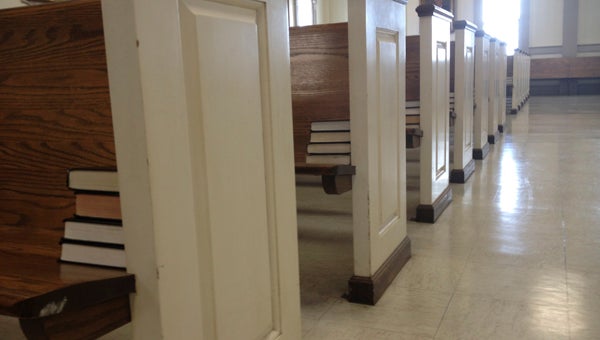First amendment watchdog targets Beaufort County court
Published 7:19 pm Friday, August 15, 2014

VAIL STEWART RUMLEY | DAILY NEWS
RELIGIOUS MATTER: Bibles located in the Beaufort County Courthouse’s Superior Courtroom benches — on which jury pools are sworn in — have captured the attention of a national organization that legally challenges violations of the separation between church and state.
An organization devoted to promoting the separation of church and state has set its sights on the Beaufort County Courthouse.
In a letter dated July 3, attorney Patrick C. Elliot states the Beaufort County Court is violating the Constitution with the continuous presence of bibles located in benched seating in the Superior Courtroom. Elliot is a staff attorney with the Freedom From Religion Foundation (FFRF); his letter, sent to Beaufort County Clerk of Court Marty Paramore. Since 1978, FFRF has tackled separation of church and state through the legal system and has had many victories, including removing Ten Commandments monuments and crosses from public land, ending 51 years of bible instruction in a Tennessee public school system and overturning a state Good Friday holiday.
“We were recently contacted by a local complainant who had reason to visit a courtroom within the Beaufort County Courthouse,” the letter to Paramore reads. “It is our information and understanding that on the day in question, between 5-7 bibles were placed in each row of courtroom seats in Room 218. We understand these seats are for citizens observing courtroom proceedings. We also understand that First Baptist Church, as a part of its ‘Courtside Ministries,’ may have donated these bibles to the courthouse.”
Elliot points out that government sponsorship of religious messages, in this case, by displaying bibles in each row of courtroom seats is unconstitutional and ends the letter by requesting Paramore inform FFRF as to the steps being taken to “address and remedy these constitutional concerns and violations.”
But ask Paramore what he plans to do to address and remedy the issue, Paramore is succinct.
“Nothing,” he said.
Based on the FFRF letter, the attorney for the organization has incomplete possession of the facts concerning the Beaufort County Courthouse bibles.
“First of all, they’re not in every bench or seat of the courtroom — just where the jury sits at. Along the aisle, you’ll see probably four bibles in each bench,” Paramore said.
There’s a reason for that, he added. While other courthouses have separate gathering places for jury pools, where potential jurors are sworn in, the Beaufort County Courthouse does not have space for that. Juries are sworn in in the Superior Courtroom — the bibles are located only on the side of the room and in the rows where the jury pool is seated. Keeping the bibles in the courtroom is a matter of expediency, he said.
“If we didn’t do it the way we do it now, the bailiffs would have to walk in with a cart of bibles, pass them out, swear everybody in, then take all the bibles back up again,” Paramore said.
Paramore sais he was surprised to get the letter and nearly threw it away, until he did a little research into FFRF. Regardless, Paramore believes that the Beaufort County Courthouse is not violating law.
“To me, when we got this letter from the Freedom from Religion Foundation, I felt like we were under attack because we were using bibles in the courtroom,” Parmore said. “And the letter implies we were doing something wrong or improper by having the Bible there. … I’m not aware of any violations in Beaufort County by having bibles in the courtroom.”
In Beaufort County Courthouse courtrooms besides Room 218, bibles are only present where witnesses and defendants can be sworn in. Paramore said any FFRF objection to bibles in the courtroom in general is misplaced, as not only are the bibles issued by the state and belong to the courts, but in the entire eight years he’s served as Clerk of Court, he’s only sworn in one person using a religious text other than the Bible.
“What the law says is they can use the holy text of their choice, but comes down to what a person believes is a holy text. For a vast majority of people in the area, it’s the Bible,” Paramore said. “ I believe in the state of North Carolina, the statute says, ‘If you want to swear on a bible, we’ll provide it. You want to swear on something else, bring it.’”
As for the First Baptist Church’s ‘Courtside Ministries,” the group sets up a table outside, near the courthouse steps, and offers to pray with those headed for court. For the past two or three months, the group has been a fixture outside the courthouse for a few hours every Monday morning, according to Paramore.
“I haven’t heard anybody be critical of it,” he said. “They offer to pray with people. I’ve prayed with them before.”
Paramore said he has written a reply to Elliot explaining the misinformation about why the bibles are located in benches in the courtroom and how they are provided by the state, but he does not know what the future may bring with regard to litigation.
“This letter could result in a lawsuit,” Paramore said. “But I don’t feel like we’re doing anything wrong.”





